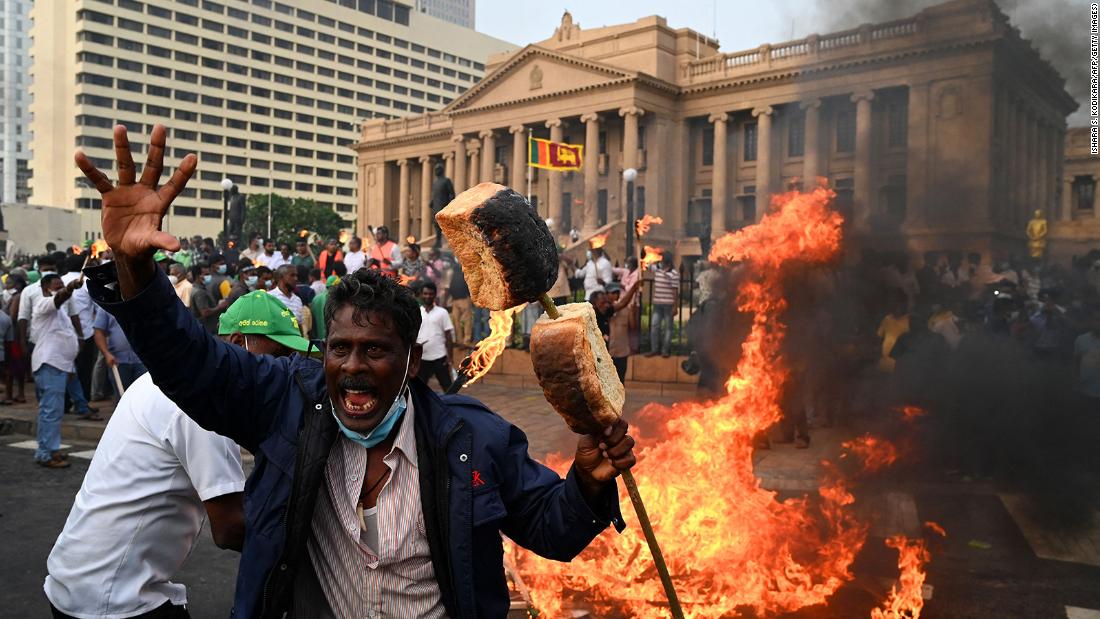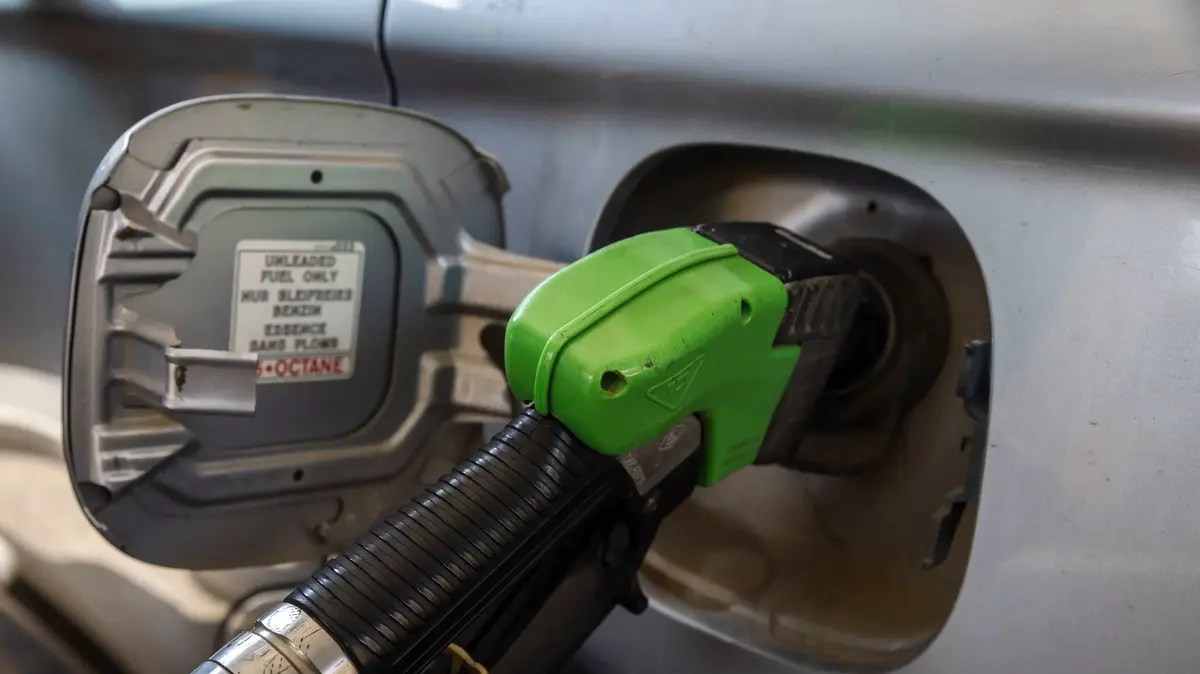These foods will rise in price in Latin America 2:13
London (CNN Business) --
When people took to the streets in Egypt in 2011, protesters were chanting about freedom and social justice, but also about bread.
The cost of pantry staples soared due to skyrocketing prices for goods like wheat, fueling fury with President Hosni Mubarak.
Now, more than a decade after the Arab Spring, global food prices are skyrocketing again.
They had already reached their highest level on record earlier this year when the pandemic, bad weather and climate crisis upended agriculture and threatened the food security of millions of people.
Then came Russia's war in the Ukraine, which made the situation much worse, at the same time causing an increase in the cost of the other daily essential fuel.
Peru Protests Show Widespread Impact of Putin's War
The combination could set off a wave of political instability, as people already frustrated with government leaders are pushed over the edge by rising costs.
"It's extremely worrying," said Rabah Arezki, a senior fellow at the Harvard Kennedy School of Government and a former chief economist at the African Development Bank.
Unrest in Sri Lanka, Pakistan and Peru over the past week highlights the risks.
In Sri Lanka, protests have broken out over shortages of gas and other basic goods.
Double-digit inflation in Pakistan has eroded support for Prime Minister Imran Khan, who is clinging to power.
At least six people have been killed in recent anti-government protests in Peru sparked by rising fuel prices.
But the political conflict is not expected to be limited to these countries.
advertising
"I don't think people have felt the full impact of rising prices yet," said Hamish Kinnear, a Middle East and North Africa analyst at Verisk Maplecroft, a global risk consultancy.
Lessons from the Arab Spring
The food consequences of the war in Ukraine 1:22
In the run-up to the anti-government protests that became known as the Arab Spring—which began in Tunisia in late 2010 and spread across the Middle East and North Africa in 2011—food prices rose sharply.
The Food Price Index of the Food and Agriculture Organization of the United Nations reached 106.7 in 2010 and jumped to 131.9 in 2011, then a record.
“Mohamed Bouazizi didn't set himself on fire because he couldn't blog or vote,” an Emirati commentator wrote in January 2011, referring to the street vendor whose act of protest helped launch the revolution in Tunisia and, ultimately, the Arab world.
"People set themselves on fire because they can't bear to see his family slowly wither, not from grief, but from cold hunger."
Circumstances in each country differed, but the overall picture was clear.
Rising wheat prices were a major part of the problem.
The situation now is even worse than then.
World food prices have just hit a new record high.
The FAO Food Price Index released on Friday came in at 159.3 in March, up almost 13% from February.
The war in Ukraine, a major exporter of wheat, corn and vegetable oils, as well as tough sanctions on Russia, a key producer of wheat and fertilizer, are expected to cause further price increases in the coming months.
The war has brought the world to the brink of a food crisis
"Forty percent of Ukraine's wheat and corn exports go to the Middle East and Africa, which are already dealing with hunger problems, and where further food shortages or price increases could stoke social unrest," said Gilbert Houngbo. , director of the International Fund for Agriculture.
Development, he told him last month.
Adding to the pain is rising energy prices.
World oil prices are almost 60% higher than a year ago.
The cost of coal and natural gas has also skyrocketed.
Many governments are struggling to protect their citizens, but fragile economies that borrowed heavily to weather the 2008 financial crisis and pandemic are the most vulnerable.
As growth slows, hurting their currencies and making it harder to keep up with debt payments, subsidies for food and fuel will be difficult to maintain, especially if prices continue to rise.
"Now we are in a situation where countries are in debt," Arezki said.
"As a result, they have no reserves to try to contain the tensions that will arise from such high prices."
According to the World Bank, about 60% of the world's poorest countries "were already over-indebted or at high risk of becoming over-indebted" on the eve of Ukraine's invasion.
Where tensions are boiling
Food chain in danger due to Russia's war in Ukraine 3:10
Asia
: In Sri Lanka, an island nation of 22 million people, an economic and political crisis is already simmering, with protesters taking to the streets in defiance of curfews and the mass resignation of government ministers.
Coping with high levels of debt and a weak economy that relies on tourism, Sri Lanka was forced to deplete its foreign exchange reserves.
That prevented the government from making payments for key imports like energy, creating devastating shortages and forcing people to spend hours lining up to buy fuel.
Its leaders have also devalued their currency, the Sri Lankan rupee, as they seek a bailout from the International Monetary Fund.
But that only made inflation at home worse.
In January it reached 14%, almost twice the pace of price increases in the United States.
Meanwhile, Pakistan's Khan faces a no-confidence motion in the country's parliament on Saturday.
While his political troubles date back years, he is now battling allegations of economic mismanagement as the cost of food and fuel rises and the government depletes its foreign reserves.
"The magnitude of the economic chaos has united the opposition to Imran Khan," said Verisk Maplecroft's Kinnear.
Middle East and Africa
: Experts are also watching for signs of political distress in other Middle Eastern countries that rely heavily on food imports from the Black Sea region and often provide generous subsidies to the public.
In Lebanon, where nearly three-quarters of the population lived in poverty last year as a result of political and economic collapse, 70-80% of imported wheat comes from Russia and Ukraine.
Key grain silos were also destroyed during the 2020 Beirut port explosion.
And Egypt, the world's largest buyer of wheat, is already experiencing enormous pressure on its huge subsidy program for bread.
The country recently set a fixed price for unsubsidized bread after prices soared, and instead is trying to secure wheat imports from countries like India and Argentina.
With about 70% of the world's poor living in Africa, the continent will also be "highly exposed" to rising food and energy prices, Arezki said.
Droughts and conflict in countries including Ethiopia, Somalia, South Sudan and Burkina Faso have created a food security crisis for more than a quarter of the continent's population, the International Committee of the Red Cross said this week.
The situation risks getting worse in the coming months, he continued.
Political instability has already been building up in parts of the continent.
A series of coups have taken place in West and Central Africa since the beginning of 2021.
Europe:
Even countries with more developed economies, which have stronger protections to protect citizens from painful price increases, will not have the tools to fully cushion the blow.
Thousands of protesters rallied in cities across Greece this week to demand higher wages to counter inflation, as competition in France's presidential election turns tighter as far-right candidate Marine Le Pen outlines her plans to cut the cost of living.
President Emmanuel Macron's government said last month it was considering issuing food stamps so low- and middle-income families could eat.
Jessie Yeung, Rhea Mogul and Sophia Saifi contributed reporting.







